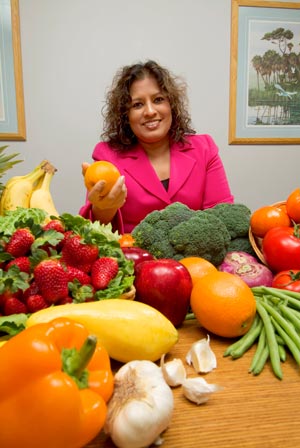
6 Powerful Strategies for Cancer Prevention
By Nagi Kumar, Ph.D.
Moffitt Cancer Center
Did you know that environmental exposures, lifestyle choices and other factors that can be changed or avoided account for between 70 percent to 90 percent of gene mutations that cause cancer? That’s according to new research published in Nature.
Here are six powerful strategies for preventing cancer! These recommendations will also benefit cancer survivors who have finished treatment.
1. The Power of Phytochemicals
We are surrounded by hundreds of fruits, vegetables, whole grains and spices that are rich in vitamins, minerals and other essential substances called phytochemicals that are critical for maintaining health and preventing diseases. Phytochemicals are substances found in plants that have been shown, used alone or in combination, to prevent cancer and heart disease, as well as control diabetes. Over 70 individual and combinations of these plant chemicals that we eat show great promise in targeting several cancer-causing pathways in the cells of our body.  Goal: Include over 10 servings of red, yellow, green, orange, blue and purple vegetables and fruits a day. The top 10 super fruits and vegetables include mango, oranges, papaya, tomatoes, broccoli, spinach, cantaloupe, blueberries, strawberries and watermelon. Mixing colors, textures, shapes and flavors, temperature and sizes of these ingredients ensures an exotic and unpredictable experience. The general rule of thumb is to paint your plate like a painter’s palate at each meal!
Goal: Include over 10 servings of red, yellow, green, orange, blue and purple vegetables and fruits a day. The top 10 super fruits and vegetables include mango, oranges, papaya, tomatoes, broccoli, spinach, cantaloupe, blueberries, strawberries and watermelon. Mixing colors, textures, shapes and flavors, temperature and sizes of these ingredients ensures an exotic and unpredictable experience. The general rule of thumb is to paint your plate like a painter’s palate at each meal!
2. The Power of Proteins
Proteins are critical to maintaining the structure and functions of our body. They help build muscles large and small and are found in every hormone. They are important for repair and maintenance, to maintain fluid balance, to make antibodies (soldiers that defend our body), to transport iron and oxygen to every cell, and to support vision. High-quality proteins are in eggs, milk, rice, beans, meats, fish, poultry and corn. Combining foods like rice and beans or rice and corn improves the quality of the proteins. Meats like beef are indeed a rich source of many nutrients — especially protein and vitamin A, along with vitamins B3, B6 and B12, iron, phosphorus, selenium, and zinc. Pork is a good source of vitamin B1 (thiamin). However, the amount of fats (cholesterol and triglycerides) in red meats is high.
Select fresh, lean cuts like top round, eye of round, tenderloin, sirloin and filet mignon. Avoid processed meats and charred meats that have been shown to increase the risk of stomach and other gastrointestinal tract cancers. Omega-3 fats are essential fats found in fish such as salmon, cod, and halibut; omega-3 rich eggs; and a few uncommon plant sources, such as walnut, flax, canola, soy, and pumpkin seed. These omega-3 fats generate chemical transmitters that suppress inflammation and are being evaluated for cancer prevention and treatment of cancer symptoms.
Goal: Include 6-8 ounces of these high-quality proteins including those rich in omega-3 fats.
3. Power of Prebiotics and Probiotics
Prebiotics and probiotics have now been found to support several biological processes that are important for maintaining good health and preventing cancer. Probiotics are groups of millions of good or useful bacteria in the digestive tract. The dynamic populations of these millions of good bacteria are important for absorbing critical nutrients including phytochemicals, impacting several important immune functions and inactivating cancer causing substances. Natural sources of these important bacteria are found in fermented yogurts including Activia and other cultured milk products. Prebiotics are complex sugars (such as lactulose, lactitol, a variety of fructo-oligosaccharides, and inulin) that are found in high fiber foods (beans, lentils, nuts) that are known to ferment and stimulate the growth of useful bacteria while suppressing the growth and activity of harmful organisms. Other foods that enhance probiotic activity are fermented soy products like tofu, Japanese miso, tempeh, kefir, bananas, garlic and onions.
Goal: Include 3-4 sources of probiotics and prebiotics in your daily diet.
4. The Power of Purposeful Physical Activity
There are several benefits of purposeful physical activity that have been well established. Getting 45 minutes of daily activity helps prevent the ageing process by controlling body weight; maintaining healthy bones, muscles, and joints; reducing the risk of developing high blood pressure and diabetes; and most importantly improving psychological well-being. Recent research shows that physical activity is associated with a reduced risk of colon and breast cancers. Several studies also have reported links between physical activity and a reduced risk of prostate, lung and endometrial cancers.
Goal: Determine the best time and form of purposeful physical activity that suits your lifestyle and is realistic. Engage in purposeful physical activity for 45 minutes a day. Simple, brisk walking at sunrise or sunset is a great habit to form in 2016!
 5. The Power of Protecting from Harmful Exposure to UV Radiation and Tobacco smoke
5. The Power of Protecting from Harmful Exposure to UV Radiation and Tobacco smoke
One of the most common types of cancer is skin cancer. The good news is that it is the most preventable. Avoid sunbathing and unnecessary sun exposure, especially between 10 a.m. and 4 p.m., the peak hours for exposure to harmful ultraviolet (UV) radiation. When outdoors, use sunscreens rated SPF 15 or higher. Apply them liberally, uniformly and frequently. When exposed to sunlight, wear protective clothing, broad-brimmed hats, and UV-protective sunglasses. Tanning beds and sunlamps are just as harmful as sunbathing, if not worse.
Tobacco, like UV radiation, is the single greatest avoidable risk factor for cancer prevention. Tobacco smoking causes many types of cancer, including cancers of the lung, esophagus, larynx (voice box), mouth, throat, kidney, bladder, pancreas, stomach and cervix. About 70 percent of the lung cancer burden can be attributed to smoking alone. Second-hand smoke, also known as environmental tobacco smoke, has been proved to cause lung cancer in nonsmoking adults. Smokeless tobacco (also called oral tobacco, chewing tobacco or snuff) causes oral, esophageal and pancreatic cancer.
Goal: If you are a tobacco user/smoker, get help to quit. If you live with a smoker, provide all your support to help them quit. Call the FreshBreak® Clinic at Moffitt at 813-745-1751.
Must haves for the new year: sunscreen, cool hat and sunglasses!
6. The Power of Screening, Early Cancer Detection and Vaccination
Screening tests for lung, melanoma, breast, colon and other cancers can help find it early, before symptoms appear. When abnormal tissue or pre-cancer is found early, these changes are relatively less complex and are easier to treat or cure. Some individuals are known to be at high risk for cancer, such as those with a personal history of cancer or a strong family history of cancer and are considered at high-risk for certain cancers.
The HPV vaccine, considered landmark progress in cancer prevention, significantly decreases the incidence of cervical cancer. Find out if you or your family members are in the age range to receive this vaccine by calling 1-888-MOFFITT.
Goal: Several screening and early detection tests are now recommended for healthy men and women. Call 1-888-MOFFITT or fill out our new patient registration form to determine the best tests based on your age and individual risk profile.
